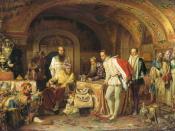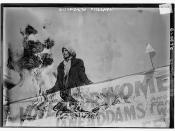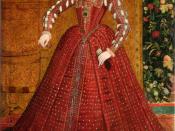In Colwin's "An Old Fashioned Story" we read about two close couples, the Rodkers and the Leopolds. It was the hope of the families that their respective children, Nelson and Elizabeth, would one day fall in love and marry to unite the two families. Elizabeth grew up with resentment towards the Rodkers as her parents constantly pressured a relationship with Nelson. As the story develops, we learn that ironically Nelson's feelings are very similar to her own. Elizabeth discovers that Nelson has played games with his parents much the same way she has done. As mutual admiration develops outside of their parents' influence, they come to realize they love each other despite the rebellious attitudes both have exhibited towards their parents' wishes. Elizabeth's rebellion and need for independence prohibited her from seeing the real Nelson.
Elizabeth learned early in life of her parents' intentions for her and became a rebellious child.
She learned to manipulate situations with her behavior to cause desired responses: "If she smiled at Nelson, they were happy and considered her behavior impeccable" (Colwin 68). In addition to her future marital arrangements, Elizabeth's parents' handpicked her friends based on economic status. Any friend that Elizabeth made was deemed economically and socially unacceptable by her parents. Elizabeth considered Nelson her "childhood disease" (Colwin 68); she felt Nelson was always forced upon her. When they were young children, they were "brought together" (Colwin 68) to play, and misbehavior was penalized by a hard squeeze to her forearm by her mother. Alternatively, Nelson behaved like a "model child in every way" (Colwin 67). She found him as repulsive as others found him perfect. The unrelenting pressure to be with Nelson continually eroded Elizabeth's relationship with her parents. They did nothing to encourage Elizabeth's love of horses or her passion for reading. "Elizabeth had never had the luxury to read undisturbed in her own house" (Colwin 71).
When Elizabeth moved away, she did not want to be bound by her parents. Therefore, she did not borrow any money from them. She took a job and an apartment in New York so she could finally "enjoy it on her own terms" (Colwin 71). Elizabeth savored her newfound freedom, staying up late reading whatever caught her interest. Even though Elizabeth had a lover, she occasionally went out with Nelson in case her mother asked if she was seeing anyone, she could say, "I see Nelson" (Colwin 72). When Elizabeth invited her parents over for dinner, she would hide all incriminating evidence such as birth control, books, and bottles of alcohol before they arrived. She wanted to avoid her parent's probing questions into her personal life. Mrs. Leopold referred to the meals as "Elizabeth's bohemian dinners" (Colwin 73). Elizabeth's ultimate act of rebellion came when she attempted to seduce Nelson's brother, James. James was considered the black sheep of his family; she felt that this would "get her mother off her back, outrage the Rodkers, and put to rest once and for all her imitation of a well-composed young woman" (Colwin 74). This plan provided her little satisfaction when she realized that James was "extremely dull" (Colwin 75).
Over the years she continued to see Nelson, often going out to dinner or taking drives in the country. After Elizabeth's lover moved away, she began spending more time with Nelson as a reliable "time filler" (Colwin 73). Nelson became a lawyer and provided pro-bono work for prison inmates. Elizabeth grew to respect him professionally as "none of Nelson's attitudes were wrong, and worse, he never bragged" (Colwin 72). After her failed attempt at seducing James, Elizabeth fell ill. Nelson stopped by to visit, and she accused him of spying on her for his parents. He responded, "I don't like my family and I never have. My family is silly, stuffy, and rigid. You're not the only one who behaved yourself and got out fast" (Colwin 76). Encouraged by his reflections on his family, Elizabeth began to realize how much in common she had with Nelson. As Elizabeth and Nelson expressed their feelings and kissed, they decided to keep their relationship to themselves to prevent any further interference from their parents.





